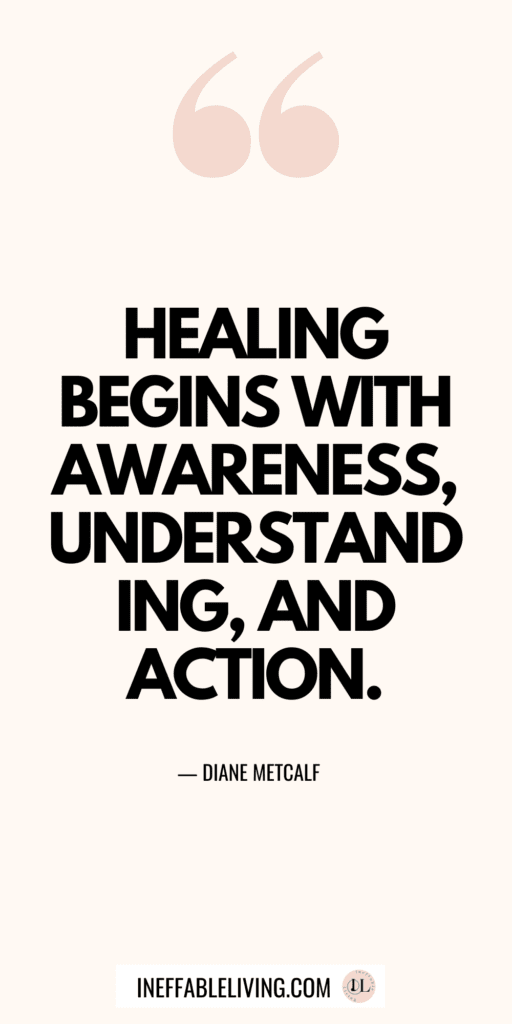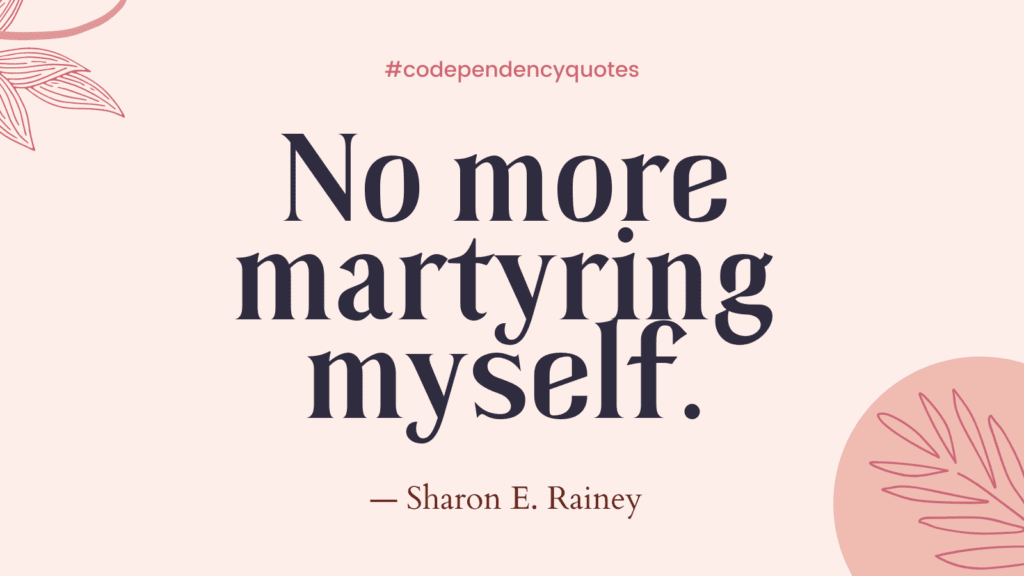This post includes codependency quotes that will help you become more aware of your codependent behaviors and support your healing journey.
Are you struggling to change your codependent behaviors?
Sometimes an inspirational quote can help you become aware of your issues and inspire you to work on healing yourself.
There is also a list of resources at the end of the post. Make sure you check them out!
Who Is The Codependent?
“A codependent person is one who has let another person’s behavior affect him or her, and who is obsessed with controlling that person’s behavior.” ― Melody Beattie, Codependent No More
But a codependent is also this:
“What’s a codependent? The answer’s easy. They’re some of the most loving, caring people I know.” ― Melody Beattie
Codependency Quotes
As a codependent, you may struggle with the issues, such as perfectionism, people-pleasing, boundary setting, love addiction, shame, emotional abuse, trauma, anxiety, depression, low self-esteem, poor communication, lack of self-awareness.
Denial Quotes
“Many of us live in denial of who we truly are because we fear losing someone or something-and there are times that if we don’t rock the boat, too often the one we lose is ourselves…It feels good to be accepted, loved, and approved of by others, but often the membership fee to belong to that club is far too high of a price to pay.” ― Dennis Merritt Jones
“Denial is the biggest obstacle to healing, and the denial around shame is immense, undoubtedly because shame is our most painful emotion. Some people who have belonged to a Twelve Step program for decades are unaware of how deeply shame controls them.” ― Darlene Lancer, Conquering Shame and Codependency
“The important middle stage of codependency is where denial, painful emotions, and obsessive-compulsive behavioral patterns are prevalent. You increase attempts to control, while feeling more out of control. When in recovery, you reclaim independence, balance, and greater peace of mind.” – Darlene Lancer
“Denial is an inability to acknowledge the truth of something. It’s considered the hallmark of addiction, and that applies to codependents, too. Denial can prolong codependency for years or decades.” – Darlene Lancer
“You’re as likely to be in denial concerning the addiction of someone close to you as you are of your own addiction to others — your codependency.” – Darlene Lancer
“You put aside and deny what you know to be true because you’re dependent upon the relationship. You pretend and act as if things are normal when they’re far from it, worsening the problem and deflecting accountability from the irresponsible person in your life. By comparison, you may think you’re acting sanely and unselfishly, yet if denial progresses, your behavior becomes increasingly irrational and motivated by self-interest.” – Darlene Lancer
“Despite being in denial, codependents still experience churning emotions. Predominant are anger and resentment and mood swings from fear and anxiety to hopelessness and despair. All of this stress over time leads to depression, which is a lack of feeling.” – Darlene Lancer
“Plain and simple, denial is a defense mechanism. Everyone does it. It’s the first defense that our brain is capable of using. It operates automatically and unconsciously. The brain can actually distort sensory information and interpret it in such a way that makes facts nonthreatening, using some of the following strategies to block what’s going on. Because it’s unconscious, it’s difficult to spot in yourself.” – Darlene Lancer
“Although you don’t choose to be in denial, you alter your perception of reality to protect yourself from being overwhelmed with emotion or facing something you fear. This means that if you don’t perceive something is wrong or threatening, then you don’t have to experience painful or conflicting feelings about it. If it doesn’t exist — there’s no problem.” – Darlene Lancer
“When it comes to addiction and codependency, denial isn’t healthy; in fact, it can be dangerous. By not facing the problem, you deprive yourself of learning constructive measures that can improve and potentially save your life and those of others.” – Darlene Lancer
“Denial doesn’t mean that you’re not bothered by their behavior. It means you don’t recognize it for what it is, such as abuse, infidelity, an addiction, or other issue. The fleeting possibility may cross your mind, but you don’t think about it. You may dismiss it as unimportant, or minimize, justify, or excuse it with explanations and rationalizations. You tell yourself that things aren’t so bad, that they’ll get better, and meanwhile have fantasies about how you’d like them to be. You may even doubt your own perceptions and believe lies or excuses you know are false. This is normal when you don’t want to admit that someone you love has a serious problem, but the troubles mount up, and one day you find you’re making excuses for behavior you never thought you’d tolerate. That’s what happens with denial. Things get worse.” – Darlene Lancer
“If you’re in denial about someone’s behavior, you won’t know it. In fact, most people will deny they’re in denial!” – Darlene Lancer
“Pain accumulates, and more pain requires more denial. An unintended consequence of denying painful feelings is that you become depressed or numb to joy, gratitude, and love, too. Energy that can be used creatively and constructively gets channeled into holding down feelings, like trying to keep the lid on a pressure cooker.” – Darlene Lancer
“Due to denial, many don’t realize that they’ve suffered abuse. Unhealed, they have difficulty experiencing intimacy. Some enter into abusive relationships. Working through their past helps stop the compulsion to repeat it.” – Darlene Lancer
“Healing entails coming out of denial and feeling your pain, but it also includes developing healthy habits to increase positive feelings and their healing chemicals that combat hopelessness, anxiety, and depression.” – Darlene Lancer
“Beware of avoiding feelings through denial, obsession, caretaking, and control. Recovery means experiencing, naming, and allowing your feelings. If you stay with them, they ebb — like a passing cloud or stormy weather. If you run from them, they follow you, until you’re forced to feel or become numb.” – Darlene Lancer
Related: How To Step Out Of Denial? Top 10 Steps To Overcome Denial When The Truth Is Heartbreaking
People-pleasing Quotes
“If you live your life to please everyone else, you will continue to feel frustrated and powerless. This is because what others want may not be good for you. You are not being mean when you say NO to unreasonable demands or when you express your ideas, feelings, and opinions, even if they differ from those of others.” ― Beverly Engel
“The only thing wrong with trying to please everyone is that there is always at least one person who will remain unhappy. You.” ― Elizabeth Parker
“It’s certainly natural and satisfying to be helpful and kind to others. However, codependent pleasing emanates from low self-esteem — more to get than give.” – Darlene Lancer
“As with care-giving, it’s not so much the actions that determine codependency, but the pleaser’s state of mind. The essential question is whether you are giving from a place of self-esteem or from guilt, fear, or insecurity.” – Darlene Lancer
“There are codependents who turn themselves inside out to accommodate others. They’re not centered in themselves and desperately want others to validate them, like them, love them, or at least need them. If that’s you, you want other esteem so much that you try to turn yourself into a human pretzel in order to please, accommodate, and win someone else’s approval.” – Darlene Lancer
“When you feel extremely insecure, you may mimic other’s actions and feelings or pretend to feel and behave the way you assume another person wants.” – Darlene Lancer
“Pleasing gives only temporary relief and builds a need for more, until the attraction to that “other” becomes an addiction.” – Darlene Lancer
“With inadequate mirroring, children learn that their needs, feelings, and thoughts are unimportant, wrong, and shameful. Repeated instances teach children that love and approval come with meeting their mothers’ needs, and for survival they repress their needs and feelings and tune in to the mother’s expectations and emotions. A child’s Self becomes organized around pleasing and performing for others’ approval in order to feel loved.” – Darlene Lancer
Related: How To Stop Being A People Pleaser? Top 21 Proven Ways to Stop People Pleasing (+Free Worksheets)
Unhealthy Relationships Quotes
“In all codependent relationships, the rescuer needs the victim as much as the victim needs the rescuer.” ― Barbara De Angelis
“Without support, denial and isolation continue, and problems get worse. You may minimize and hide from yourself and others painful aspects of your relationship and withdraw from outside activities and friends.” – Darlene Lancer
“Concerning the narcissist- after having been so seemingly incredibly loving and gentle, compassionate and caring- it would be like a light switch had suddenly been turned off and “all of a sudden” they simply did not care. They turned into a cold person, someone without love, compassion, empathy or regard for the subject’s feelings what so ever. It’s like they suddenly and literally stopped being human.” ― Jacqueline Servantess
“False guilt is feeling guilty when one is not actually guilty. Genuine guilt is a result of wrongdoing. It is appropriate to feel guilty if we had done something wrong. However, false guilt is rooted in deception, denial, and dysfunction. It is directly connected to our destructive and codependent relationship with a narcissist.” ― Dana Arcuri
“Allowing bad behavior rewards it. Behavior rewarded is repeated. Don’t wait for your anger to confront.” ― Darlene Lancer
“I learned again and again in my life, until you get your own act together, you’re not ready for Big Love. What you’re ready for is one of those codependent relationships where you desperately need a partner.” ― Bruce H. Lipton
“Many codependents have never witnessed what a healthy relationship is like.” – Darlene Lancer
“Addicts obsess about their “drug” of choice, whether it’s alcohol, food, or sex. They plan and look forward to it. Codependents do that in relationships. Their lives revolve around someone else — especially those they love. Their loved ones preoccupy their thoughts, feelings, and conversations. Like jumpy rabbits, they react to everything, put aside what they need and feel, and try to control what they can’t. The stress of it feels normal, but it’s not.” – Darlene Lancer
“Recovery from codependency doesn’t necessitate ending a relationship to become independent. The goal is to be able to function better and more independently in the relationship.” – Darlene Lancer
Healing Codependency Quotes
Some of the most important components of codependency recovery include: Self-awareness, setting boundaries, being more assertive, letting go of controlling behavior, learning how to receive, self-care, self-love and self-acceptance.
Self-Awareness
“Healing begins with awareness, understanding, and action.” ― Diane Metcalf
“Don’t be a victim of your thoughts.” ― Darlene Lancer
“Life is too short to waste any amount of time on wondering what other people think about you. In the first place, if they had better things going on in their lives, they wouldn’t have the time to sit around and talk about you. What’s important to me is not others’ opinions of me, but what’s important to me is my opinion of myself.” ― C. JoyBell C.
“The first priority is to heighten your awareness and open up your thinking and understanding about codependency and addiction and how each has and continues to affect your family and your life.” – Darlene Lancer
“Your codependent self will fight change tooth and nail to stop your progress. You need continual support and self-awareness to prevent slipping backwards. Perseverance pays off. The best help comes from people experienced with codependency, whether it comes in the form of a Twelve Step program, counselor, or psychotherapist.” – Darlene Lancer
“Getting to know someone means learning their tastes, opinions, and feelings about things. Learning about yourself is just the same. Begin listening and watching, just as you may observe someone at work or school before you plan to spend time together.” – Darlene Lancer
“Start paying attention to your conversations during the day. See if you can listen to yourself while someone is talking to you. Wonder about how you feel.” – Darlene Lancer
“Meditation also builds self-awareness permitting you to think before you speak or act from your old habits. You’re able to pause and choose your responses in conversations.” – Darlene Lancer
Related: Top 10 Clear Signs Of Toxic Shame In A Person (& How to Deal With Toxic Shame?)
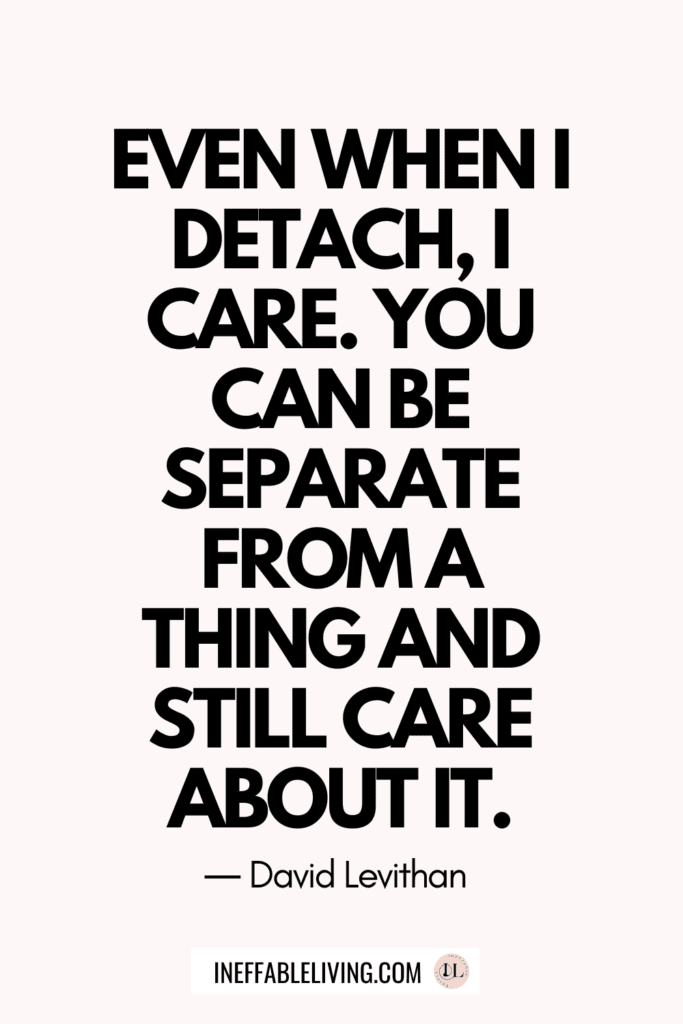
Setting Boundaries & Becoming More Assertive
“Daring to set boundaries is about having the courage to love ourselves even when we risk disappointing others.” ― Brene Brown
“When we begin to set boundaries with people we love, a really hard thing happens: they hurt. They may feel a hole where you used to plug up their aloneness, their disorganization, or their financial irresponsibility. Whatever it is, they will feel a loss. If you love them, this will be difficult for you to watch. But, when you are dealing with someone who is hurting, remember that your boundaries are both necessary for you and helpful for them. If you have been enabling them to be irresponsible, your limit setting may nudge them toward responsibility.” ― Henry Cloud
“Love yourself enough to set boundaries. Your time and energy are precious. You get to choose how you use it. You teach people how to treat you by deciding what you will and won’t accept.” ― Anna Taylor
“We can say what we need to say. We can gently, but assertively, speak our mind. We do not need to be judgmental, tactless, blaming or cruel when we speak our truths.” ― Melody Beattie
“Setting boundaries draws a line between you and someone else. It often requires that you say, “No,” “I don’t want to . . .,” I don’t like that . . .,” “I’m not willing to . . .,” or “Stop it.” It’s an advanced level of stating an “I” position. This can be difficult because even when you can express yourself, you may not believe that you have a right to say “No.”” – Darlene Lancer
“Boundaries indicate respect for others and for you. Setting boundaries shows that you’re taking responsibility for, caring for, and protecting yourself. Don’t advise or tell others what to do, and don’t let them tell you. Don’t blame them, and don’t let them blame you. Respect others’ bodies, beliefs, thoughts, feelings, and material things, and require that they respect yours.” – Darlene Lancer
“In setting boundaries, you have to think and not react. You won’t be able to set them until you’re ready and clear about what you want. Nagging, yelling, blaming, and complaining are reactions that focus on the other person and aren’t boundaries. Until your words match your actions, you’re not setting a boundary, and I guarantee you, you’re going to be ignored.” – Darlene Lancer
“To set limits, you need to know your bottom line.” – Darlene Lancer
“When you’re ready to set your boundary, you needn’t raise your voice. You can be calm, kind, and respectful and still be heard. Your resolve’s communicated. The hardest one to convince is you. When you really know your limits, others sense it and won’t violate your boundaries.” – Darlene Lancer
“If you keep setting boundaries and carrying out consequences, the abuser will get the message that the abuse isn’t getting the desired effect and will stop. If not, reconsider your bottom line and more consequences.” – Darlene Lancer
“Setting boundaries with others may make you feel anxious and guilty. When you take an emotional risk, it’s normal to have anxiety about what may happen or self-criticism about what you said or should have said. This is the old you who’s terrified because you’re challenging old rules and may fear retaliation or abandonment. These feelings pass, and each time you set a boundary, it gets easier.” – Darlene Lancer
“When you begin setting boundaries, you may feel stiff and be inflexible about them. This is a normal reaction to having had no boundaries and the fear of not being able to maintain them. When you trust yourself and discover that others respect your boundaries without jeopardizing the relationship, you become more flexible. You feel empowered and free to allow others to say “No” to you.” – Darlene Lancer
Related: How To Set Boundaries With Narcissistic Parents?
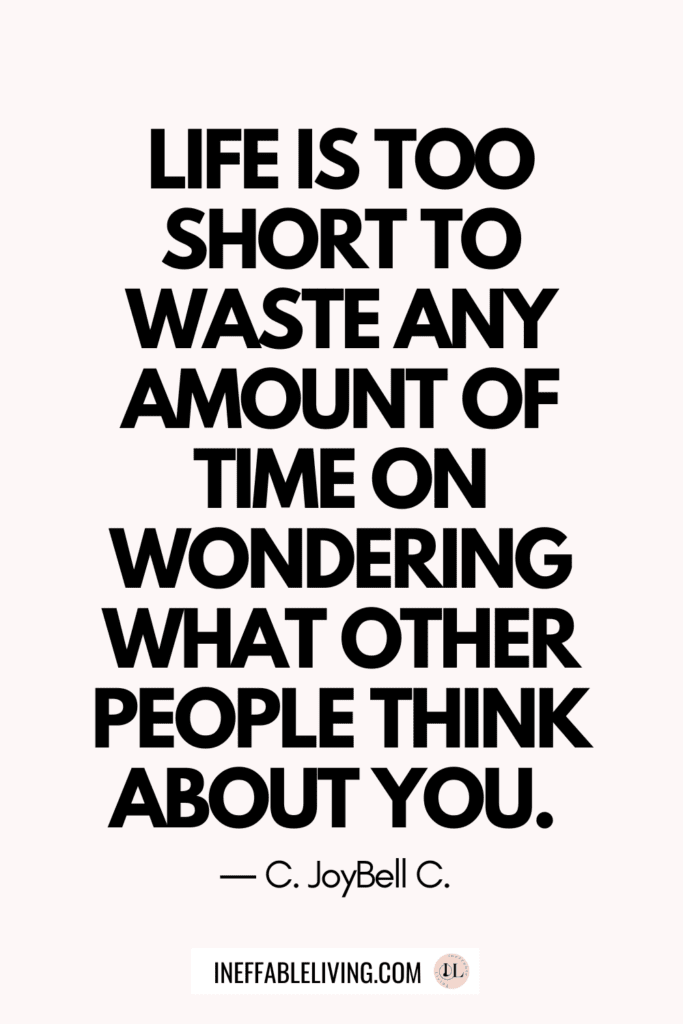
Letting Go of Controlling, Enabling, and Rescuing
“No one changes unless they want to. Not if you beg them. Not if you shame them. Not if you use reason, emotion, or tough love. There’s only one thing that makes someone change: their own realization that they need to do it. And there’s only one time it will happen: When they decide they’re ready.” ― Lori Deschene
“Allowing others to suffer the consequences of their own actions, without enabling them, is the best motivation for them to undertake the difficult task of change.” ― Darlene Lancer
“I used to spend so much time reacting and responding to everyone else that my life had no direction. Other people’s lives, problems, and wants set the course for my life. Once I realized it was okay for me to think about and identify what I wanted, remarkable things began to take place in my life.” ― Melody Beattie
“The problem of the addict’s addiction belongs to the addict. It’s best to invest your energy in yourself, children, work, supportive friends, interests, and hobbies. By not enabling and controlling, you become more independent and less subject to being controlled. This both affords you greater freedom and happiness, and allows the addict to deal with his or her addiction.” – Darlene Lancer
“Enabling refers to caretaking that removes the natural consequences of someone’s irresponsible behavior. It also includes handling responsibilities for someone that they can and should be handling. Often Underdog will badger, blame, and manipulate Top Dog into enabling.” – Darlene Lancer
“Enablers have a warped sense of responsibility and feel extremely guilty not enabling, even though they’re not responsible for the problems created by others.” – Darlene Lancer
“If you assume responsibility for your partner’s happiness, you’re enabling his or her dependence, irresponsibility, and childish behavior and depriving him or her of the opportunity to grow-up and become independent. On the other hand, by taking responsibility to make yourself happy, you bring happiness to the relationship, and you’re able to interact with your partner from an openhearted place.” – Darlene Lancer
“Managing and controlling behaviors, which include caretaking and enabling, violate others’ boundaries. Managing someone’s life shows disrespect. It sends the message that the person is incompetent and needs your help. Underneath are your fear and expectations about that person’s life.” – Darlene Lancer
“Nothing you say makes any permanent difference. You come to realize that your words and enabling actions are futile, and only breed resistance. In fact, stopping addictive behavior is so difficult for addicts that anyone attempting to influence them distracts them from the problem of their addiction. You become the obstacle in their mind. Controlling and enabling actually prolong an addiction.” – Darlene Lancer
“After you get out of the way and stop controlling and/or enabling and protecting an addict from the truth, you prepare yourself to set boundaries.” – Darlene Lancer
“By not enabling and controlling, you become more independent and less subject to being controlled. This both affords you greater freedom and happiness, and allows the addict to deal with his or her addiction.” – Darlene Lancer
Read: Best 20 Must-Read Books On Codependency
“When we let go of our reactions and detach from other people’s moods, actions, and words, we take back our power. Instead of reactors, we become self-determined actors in our lives. We take charge of ourselves and decide how we act in that moment and every moment, skyrocketing our self-esteem” ― Darlene Lancer, Codependency for Dummies
“Even when I detach, I care. You can be separate from a thing and still care about it.” ― David Levithan
“No more martyring myself.” ― Sharon E. Rainey
Related: How To Stop Caretaking? Best 9 Ways to Start Receiving More In Life & Relationships
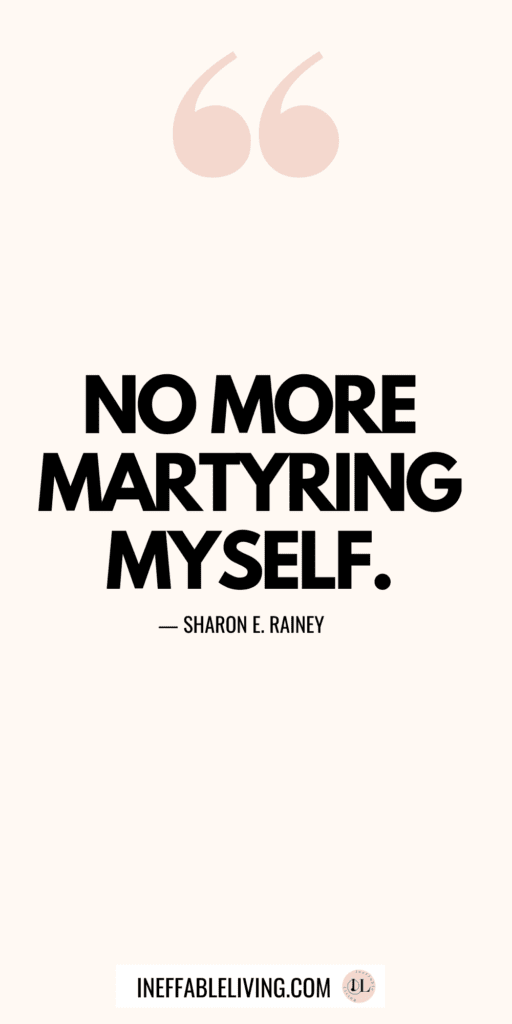
Self-Care, Self-Acceptance, and Self-Love
“Self-care is how you take your power back.” ― Lalah Delia
“Lighten up on yourself. No one is perfect. Gently accept your humanness.” ― Deborah Day
“Forgive yourself for not knowing better at the time. Forgive yourself for giving away your power. Forgive yourself for past behaviors. Forgive yourself for the survival patterns and traits you picked up while enduring trauma. Forgive yourself for being who you needed to be.” ― Audrey Kitching
“Most of our suffering comes from resisting what is already here, particularly our feelings. All any feeling wants is to be welcomed, touched, allowed. It wants attention. It wants kindness. If you treated your feelings with as much love as you treated your dog or your cat or your child, you’d feel as if you were living in heaven every day of your sweet life.” ― Geneen Roth
“Don’t rely on someone else for your happiness and self-worth. Only you can be responsible for that. If you can’t love and respect yourself – no one else will be able to make that happen. Accept who you are – completely; the good and the bad—and make changes as YOU see fit—not because you think someone else wants you to be different.” ― Stacey Charter
“The most painful thing is losing yourself in the process of loving someone too much, and forgetting that you are special too.” ― Ernest Hemingway
“Authenticity is the daily practice of letting go of who we think were supposed to be and embracing who we are.” ― Brene Brown
“Self-acceptance means that instead of thinking about how you need to be different, you accept who you are. Catch yourself making comparisons to others — both positively and negatively. Perhaps you’re comparing your insides to others’ outsides. Stop and remember that you and everyone else have a singular, unique fingerprint. Imagine that it includes all your assets and flaws, all your talents and limitations. Say to yourself, “This is who I am, and it’s okay.” If it’s helpful, tell yourself, “This is how God made me, and wanted me to be. God willed me to be as I am.” Repeat the words of Walter Cronkite, “That’s the way it is,” and Popeye, “I am what I am.”” – Darlene Lancer
“This attitude of self-acceptance works magic. When you start accepting yourself, you stop struggling to present yourself as smart, strong, kind, sexy, or any other pretense. Self- acceptance allows you to be authentic. You can finally relax, and more of the inner real you comes forward. You have no shame or fear of revealing yourself when you accept yourself unconditionally. This attitude spills over onto others for whom you have more compassion and acceptance. You won’t feel the need to control or change them or even convince them to agree with you.” – Darlene Lancer
“Whereas acceptance is an attitude toward yourself, love is a combination of both feeling and action. Many think self-love is egotism or narcissism, but actually egotists and narcissists don’t love themselves at all. A “big ego” is compensation for lack of self-love. Codependents think too little of themselves, not too much.” – Darlene Lancer
“Love for your Self is healthy. The Bible says, “Love they neighbor as thyself.” You’re a human being as worthy of love as anyone else.” – Darlene Lancer
“Contrary to the idea that self-love is selfish and takes away from your ability to love others, the opposite is true. The greater is your love for yourself, the greater will be your ability to love others. Moreover, you only allow yourself to receive as much love as you give to yourself.” – Darlene Lancer
“Love involves understanding, respect, acceptance, responsibility, and compassion. These virtues are not compartmentalized, but are experienced for your Self and for others. Love is not divisible. As you develop these aspects in yourself, your ability to love yourself and others grows.” – Darlene Lancer
“Although self-love is certainly an important goal, it’s not easily attained, particularly in Western society with its many distractions and emphasis on speed and productivity. Love requires focused attention, discipline, and patience. In addition, loving includes empathy and compassion, which enables you to feel with acceptance, caring, and understanding what someone else is feeling and to extend this compassion toward yourself.” – Darlene Lancer
“Self-love is very different from self-pity, which is a blend of fear, judgment, and anger about troubles that have befallen you. With self-compassion and empathy, you’re present to your raw feeling experience and are able to allow it and comfort yourself with understanding and care. Self-pity implies, “It shouldn’t be this way,” but with self-love, there’s compassion for and acceptance of what is, with no attempt to resist or fix it.” – Darlene Lancer
“Loving yourself is a life journey and goal that starts with self-knowledge.” – Darlene Lancer
“Self-love also means having good will toward yourself. Try seeing yourself through compassionate and understanding eyes, as you may see a child, pet, or close friend. Look for the positive motive behind your actions — it’s usually self-preservation — and that’s okay. Your actions are a result of what you’ve learned from your parents and experiences to date. By compassionately observing and thinking about your behavior, you increase your opportunities to change it in the future.” – Darlene Lancer
Related: How To Start A Self Love Journey? Top 10 Powerful Ways to Love Yourself More
Get FREE Overcome Codependency Worksheets
Codependent No More Quotes
“Once they have been affected—once “it” sets in—codependency takes on a life of its own. It is similar to catching pneumonia or picking up a destructive habit. Once you’ve got it, you’ve got it. If you want to get rid of it, YOU have to do something to make it go away. It doesn’t matter whose fault it is. Your codependency becomes your problem; solving your problems is your responsibility.” ― Melody Beattie, Codependent No More
“Codependents are reactionaries. They overreact. They under-react. But rarely do they act. They react to the problems, pains, lives, and behaviors of others. They react to their own problems, pains, and behaviors.” ― Melody Beattie, Codependent No More
“Ever since people first existed, they have been doing all the things we label “codependent.” They have worried themselves sick about other people. They have tried to help in ways that didn’t help. They have said yes when they meant no. They have tried to make other people see things their way. They have bent over backwards avoiding hurting people’s feelings and, in so doing, have hurt themselves. They have been afraid to trust their feelings. They have believed lies and then felt betrayed. They have wanted to get even and punish others. They have felt so angry they wanted to kill. They have struggled for their rights while other people said they didn’t have any. They have worn sackcloth because they didn’t believe they deserved silk.” ― Melody Beattie, Codependent No More
“Detachment is not a cold, hostile withdrawal; a resigned, despairing acceptance of anything life and people throw our way; a robotical walk through life oblivious to, and totally unaffected by people and problems; a Pollyanna-like ignorant bliss; a shirking of our true responsibilities to ourselves and others; a severing of our relationships. Nor is it a removal of our love and concern… Detachment is based on the premises that each person is responsible for himself, that we can’t solve problems that aren’t ours to solve, and that worrying doesn’t help. We adopt a policy of keeping our hands off other people’s responsibilities and tend to our own instead. If people have created some disasters for themselves, we allow them to face their own proverbial music. We allow people to be who they are. We give them the freedom to be responsible and to grow. And we give ourselves that same freedom. We live our own lives to the best of our ability. We strive to ascertain what it is we can change and what we cannot change. Then we stop trying to change things we can’t. We do what we can to solve a problem, and then we stop fretting and stewing. If we cannot solve a problem and we have done what we could, we learn to live with, or in spite of, that problem. And we try to live happily — focusing heroically on what is good in our lives today, and feeling grateful for that. We learn the magical lesson that making the most of what we have turns it into more.
Detachment involves “present moment living” — living in the here and now. We allow life to happen instead of forcing and trying to control it. We relinquish regrets over the past and fears about the future. We make the most of each day.” ― Melody Beattie, Codependent No More
Related: How To Break Controlling Behavior? Best 6 Ways to Let Go of Wanting to Control Everything
“We Are Lovable. Even if the most important person in your world rejects you, you are still real, and you are still okay.” ― Melody Beattie, Codependent No More
Codependency Resources
Blog Posts
Best 10 Relatable Codependency Blogs (+FREE Resources on Codependency)
How To Stop Love Addiction? Top 5 Proven Steps to Overcome Love Addiction
How to Heal Codependency and Savior Complex? Top 12 Strategies to Overcome Codependency For Good
How To Break Codependency Habits For Good? Top 13 Codependent Habits to Quit Today
EFT For Codependency: Simple 5 EFT Steps That Will Help You Break Free From Codependency
Worksheets
Overcome Perfectionism & Procrastination Worksheets
Mother Wounds Journaling Prompts
Improve Your Relationship Worksheets
Increase Your Self-Awareness Worksheets
Stop People-Pleasing Worksheets

